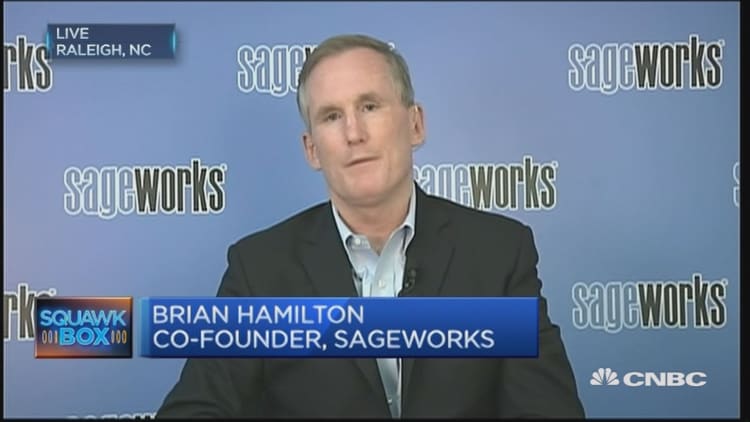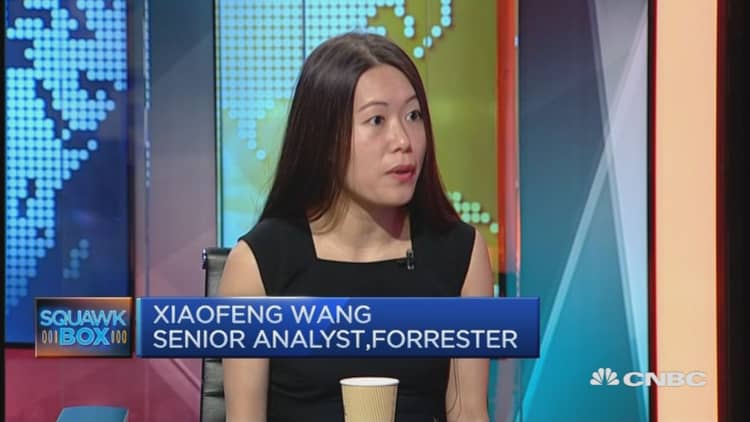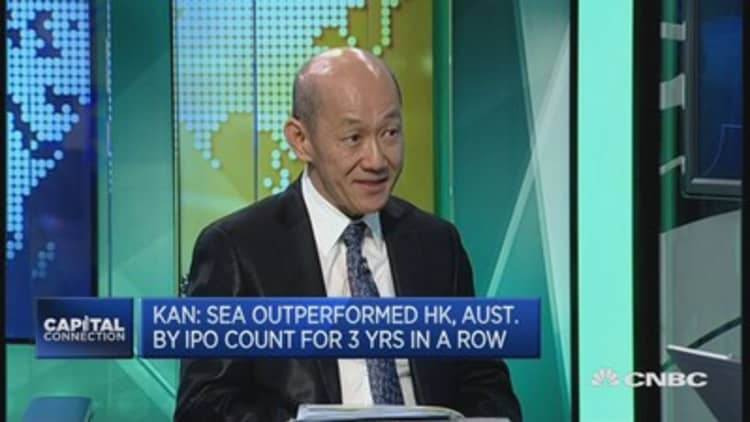When Jack Ma criticised Hong Kong last month for having outdated stock market listing practices, the Alibaba founder hit the city where it hurts.
Hong Kong's rivalry with New York has only heightened since the billionaire chose the US for his ecommerce group's initial public offering two years ago.
And next year, the battle between the world's two largest listing centres will only become more heated, as three Chinese tech stocks face the same choice as Mr Ma.
More from the Financial Times:
Schneiderannounces flotation in boost for US IPOs
Lex theme: deals that did not happen
Netmarble snaps up US games studio Kabam
This year New York narrowly edged out Hong Kong in the global rankings for IPOs, with $24.6 billion on the New York Stock Exchange and Nasdaq combined, while Hong Kong had $24.5 billion, according to Dealogic. Shanghai came next with about $16 billion.
Tokyo and Copenhagen rounded out the top five with $9.6 billion and $5.9 billion of new listings to their credit. London fell to eighth with $5.5 billion.

But these numbers were significantly lower than last year. Globally, new listings total $141 billion this year, down a third on 2015 and the weakest level recorded since 2012.
"Six of the 12 months were effectively closed by macro events — China growth fears, Brexit, the US election — and that is very rare," explains Phil Drury, head of Citigroup's capital markets origination team for Europe, the Middle East and Africa. "But this time next year, I think we'll be looking back on a robust 2017."
Hopes for improvement rest heavily on the tech sector. Heading the 2017 IPO list is Snap, the messaging app readying for a New York listing as soon as March.
Bankers will be seeking a repeat of the July debut of Line, the Japanese rival to WhatsApp that braved post-Brexit market turmoil to raise $1.3 billion. Its shares surged on debut in Tokyo and New York.
With a target valuation of between $20 billion and $25 billion, Snap would be one of the largest IPOs in recent years. A successful float would also potentially encourage other so-called tech unicorns, private companies with valuations of at least $1 billion, to consider taking the plunge.

"2017 is set up to be a rebound year," says Anthony Kontoleon, global head of the equity capital markets syndicate team at Credit Suisse. He believes the late-year stock market rally in 2016 will provide momentum going into the new year.
"The sectors that seem to have the most strength in terms of backlog are tech, retail/consumer and energy," he suggests.
Alongside Snap, there is heightened interest in the potential listings of three Chinese tech groups: Ant Financial, the payments arm of Alibaba; Lufax, the online financial platform set up by insurer Ping An; and Zhongan, the online insurer backed by Ping An, Alibaba and its rival Tencent.
All three are considering their financing options, including where they might list. Funding rounds in the past two years valued Ant at about $60 billion, Lufax $19 billion and Zhongan $8 billion.
Listing in Shanghai or Shenzhen would probably produce higher valuations than Hong Kong, but the Chinese regulator-controlled IPO queue is estimated to be at least 18 months long.
Hong Kong offers some home advantage while allowing companies to raise funds outside China's tightening capital controls. However, compared with New York, it has few tech stocks to act as benchmarks and it does not allow companies to offer dual-class shares.
"They're all giants in their spaces, they have global appeal and they would be successful in a Hong Kong format," suggests Nick Johnson, JPMorgan's head of equity capital markets for Asia-Pacific. "Over time, they want to take China to the rest of the world — and having international access is part of that."

Hong Kong's capital raising record is not without some tarnished performances, though.
China's Postal Savings Bank became the world's biggest deal of the year, raising $7.4 billion in September, but its shares barely traded above their issue price and now sit about a tenth lower.
Meitu's soggy debut in Hong Kong this month also demonstrates a bigger challenge for bankers looking to attract the likes of Ant and Lufax to the city.
As a Chinese maker of "selfie" photo-enhancing apps, Meitu was able to raise $629 million in the city's biggest tech listing in years, but its shares priced at the bottom of their target range and have since fallen.
"We were all disappointed — we all hoped for a better performance from Meitu," admits one equities specialist who was not on the deal.
But U.S. bankers are optimistic about an uptick in activity, based on the performance of other companies that did brave the choppy markets this year.
The 2016 vintage of U.S. IPOs are up about 20 per cent on average in the year to date, while 2015's deals finished the year down more than 6 per cent, according to Dealogic.
"Not only does this positive performance encourage investors and new IPO issuers to come to market in 2017, it also sets up a positive backdrop for follow-on raises for growth and secondary selldowns," argues Liz Myers, head of global equity capital markets at JPMorgan.

